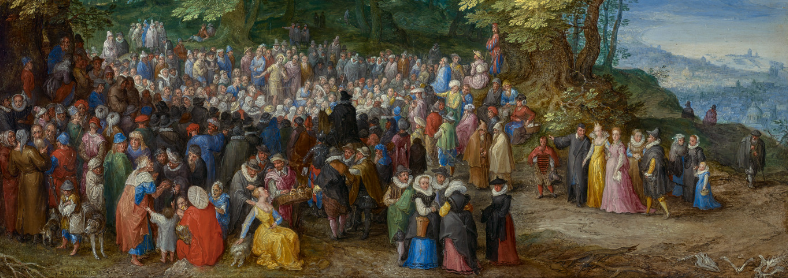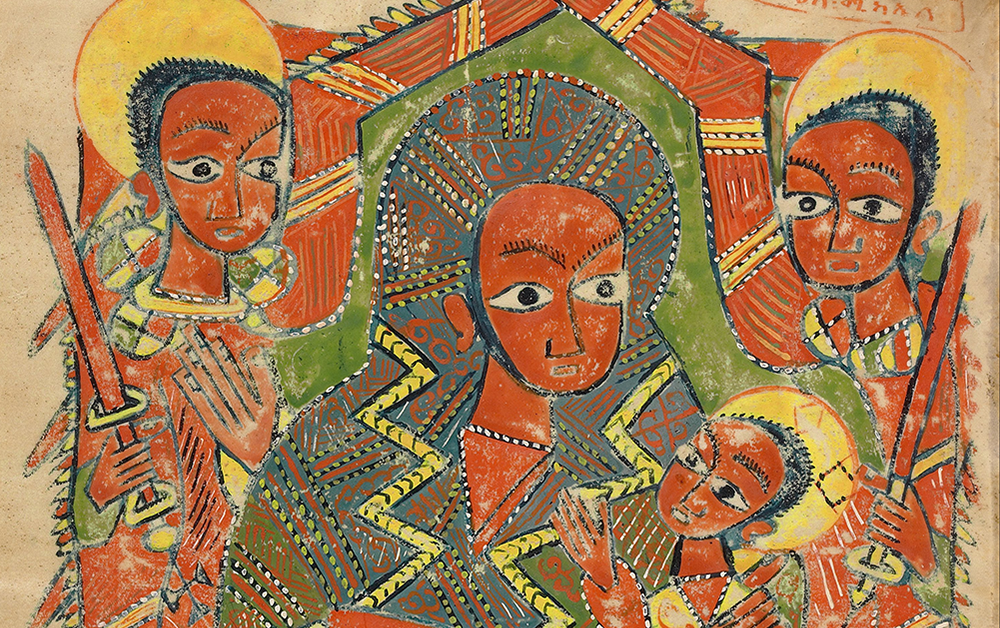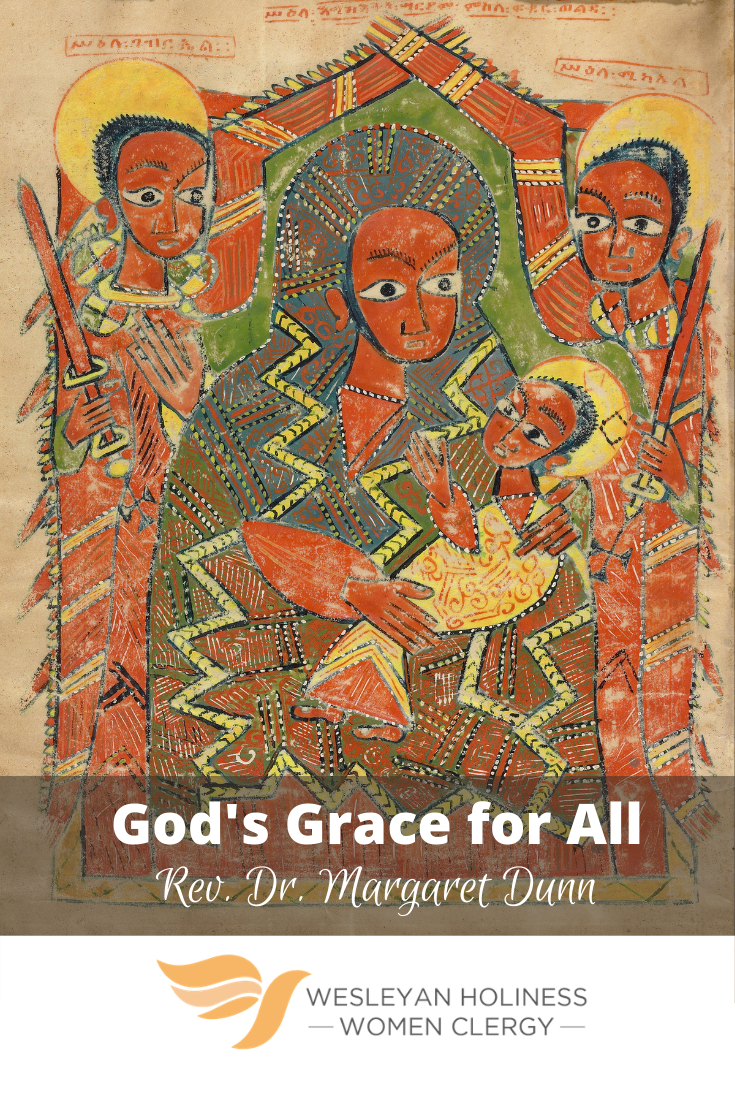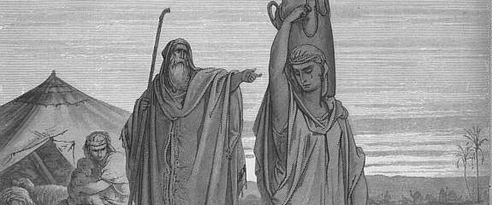Dr. Margaret Dunn is an ordained minister in the Church of God. She is serving at Mid America Christian University as an adjunct instructor and at Parkgate Community Church as a learning hour teacher for 3rd-5th grade students, a prayer partner, and a member of the missions team. She has been a member of leadership teams for the Church of God on the state and national level and was a member of the planning team for the 3rd, 4th, and 5th WHWC conferences. She lives in Pasadena, Texas.
God's Grace for All
Rev. Dr. Margaret Dunn • December 21, 2020 | WHWC
Made Available Through The Women of Jesus' Lineage
As we conclude the Advent season and the celebration of the birth of Christ, I find myself thinking about the women listed in Matthew as being in the lineage of Jesus. They are Tamar (Matthew 1:3); Rahab and Ruth (Matthew 1:5); Bathsheba (Matthew 1:6); and Mary (Matthew 1:16). I have been pondering why would Matthew name them in the lineage of David. As I have read and listened to others talk about them, I have made a few discoveries.
These women demonstrate the availability of the grace of God to all people because in some ways they were all outsiders whose lives demonstrate acceptance by God. God’s grace is available to all because Jesus came so we all could be welcomed into the family.
1. Tamar
Tamar was a Canaanite woman (Genesis 38) who was married to Judah’s oldest son Er. Judah was the brother of Joseph and had himself married a Canaanite woman. When Er died, she married the second son Onan. When Onan died, Judah sent her home to her father to wait for the youngest son. At this point in time, Tamar must have felt dismissed and abandoned by the family and person (Judah) who was to protect her. She was a widow and had the right to search for a husband in another family, otherwise she had no chance for a husband or children.
When Tamar portrayed a prostitute, she tricked Judah into carrying out his responsibility to protect Tamar and make sure was cared for. In her story, God’s grace is evident because God accepted her good intentions and forgave her. She was an outsider whose acceptance by God is shown as her name is included in the lineage of Jesus.
2. Rahab
Rahab (Joshua 2 and 6) was also a Canaanite Gentile who lived in the city of Jericho. She protected the spies from discovery and gave them lodging. She told them in Joshua 2 that she believed in the God of the Israelites. She asked that in return for her protection of them, they would protect her when they took over Jericho. Joshua and the spies keep their word, and Rahab and her family were spared.
Rahab is also mentioned in Hebrews 11 and James 2 as a righteous woman. Rahab wanted to be saved both physically and spiritually. God does both in her story. God welcomed Rahab, an outsider, because she wanted to know him and to be known by Him. Rahab did not have the best past, but God welcomed her with open arms. She was an outsider whose acceptance by God is shown as her name is included in the lineage of Jesus.
3. Ruth
Ruth was from the land of Moab. In Deuteronomy 23:3, God says that “no Moabite shall enter the assembly of the Lord.” So how did Ruth become included in the lineage of Jesus? Naomi was from Judah and when she returned to Judah, her daughter-in-law Ruth went with her.
Major Bonnie Kirk says in an online resource, “Naomi was a widow, who was selling her husband’s land to the closest kinsman–redeemer in her family. Along with this deal would also come Ruth as wife to the kinsman–redeemer so that any heir would help maintain the name of the dead (Elimelech) with his property. The closest kinsman–redeemer rejected this offer since he already had a family and heirs. This opened the door for Boaz who was next in line. The elders and all the people were witnesses then that Boaz bought all of Naomi’s land and acquired Ruth as his wife. (4:1–11).”
In Ruth’s story, God’s love and grace brings her back into the story. She was an outsider whose acceptance by God is shown as her name is included in the lineage of Jesus.
4. Bathsheba
Bathsheba whose story begins in 2 Samuel 11 is not mentioned by name in Matthew’s gospel. She is identified as “her who had been the wife of Uriah.” (Matthew 1:6). Uriah was a Hittite and while fighting with David, he probably did not worship the LORD GOD of Israel. We know the story of David and Bathsheba, the death of their first child, and we read of their marriage and the births of four sons named Solomon, Nathan, Shimea and Shobab.
Bathsheba’s life indicates that God does forgive and bestows His grace when sin is confessed. Bathsheba was an outsider whose acceptance by God is shown as her name is included in the lineage of Jesus.
5. Mary
Mary was a young woman from Galilee. Some scholars
indicate that the genealogy of Jesus recorded in Luke is possibly the genealogy of Mary since the father is listed as Heli (Luke 3:23) while Matthew indicates Joseph was the son of Jacob (Mt. 1:16). If this is true, then in Luke's genealogy, one notes that both Nathan (the son of David and Bathsheba) and David are mentioned in Luke 3:31. Mary’s lineage included the son of Bathsheba and David, the son of Boaz and Ruth, the son of Rahab and Salmon, and the son of Tamar and Judah.
Being Jewish, Mary was not an outsider as the other women in the genealogy are, but the outsiders are included in her lineage. Mary is described as being highly favored and totally submits to His will of being the mother of Jesus. Mary was very young and was not the woman one would expect to be the mother of the King of Kings.
God's Grace for All
These five women demonstrate that God’s grace is available to all because Jesus came so we all could be welcomed into the family. They were outsiders and ordinary women through whom God did extraordinary things including the birth of his son Jesus.
As we conclude our season of Advent and move towards a new year, I wonder: how will we respond to the outsiders who come into our churches? How will we respond to those who come in the building but don’t look quite right? How will we respond to an outsider in our social group? Do we feel like an outsider in our social or family groups? Do we feel like an outsider in our faith group?
What do we do when we feel like an outsider? Do we become bitter or do we respond as these five women and embrace the hope they found in God. Do we obey so that our God can do extraordinary things through us ordinary women, called by God to proclaim His love and grace to those around us? The hope of acceptance by God is ours. During this season let us embrace it.
Resources
Aren’t the Genealogies of Jesus Given in Matthew and Luke Contradictory? Josh McDowell Ministries. Retrieved on Dec 21, 2020 from https://www.josh.org/answer/arent-genealogies-jesus-given-matthew-luke-contradictory/
Kirk, Major Bonnie (2019, Aug 27) Conclusion: The Five Women in the Genealogy of Jesus. The Salvation Army Women's Ministries Resources. Retrieved on Nov 11, 2020 from https://wmresources.org/blog/conclusion-the-five-women-in-the-genealogy-of-jesus/
Discussion Group from Preacher Girl School
led by Dr. Kimberly Majeski on the women in the genealogy of Jesus. November 2020.
Scripture:
Genesis 38
Deuteronomy 23:3
Joshua 2, 6
Ruth 4:1-11
2 Samuel 11
Matthew 1
Hebrews 11
James 2
Cover Photo: Virgin and Child with the Archangels Michael and Gabriel
Gospel Book, Ethiopian, Ms. 102 ca. 1504-5.
Retrieved on Dec 21, 2020 from Art in the Christian Tradition, a project of the Vanderbilt Divinity Library, Nashville, TN.
Enjoyed this article? Connect with us on one of our social media platforms. Share it and forward it to a friend:

Wesleyan Holiness has a rich and diverse history of women empowered by the Holy Spirit following God in obedience to Him, blocking out the voices of those who didn't embrace or encourage women preachers. Each one of them are the women whose shoulders we stand upon, making way for the next generation of women pastors coming up behind us.

The wonderfully freeing truth we have in the Beatitudes is that they are not a checklist of to-dos and rules to hem us in, keep us in line, or that we must check off. The Beatitudes are words given to us as grace, dripping like honey from a honeycomb with blessing and hope in a desperate and broken world.





